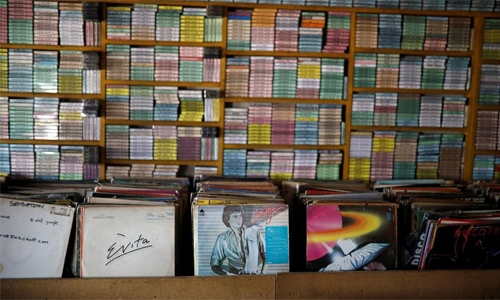The end of iTunes marks the day music really died
When Apple an - nounced last week that it was killing iTunes, few mourned the application’s impending demise. In fact, most critics described it as having become bloated over its long life. In response, Apple will break the existing version down into three parts – music, TV and podcasts – to make it more intuitive and user-friendly. I was neither an early adopter of iTunes nor an especially late arrival, and, like millions of others around the world, I’ve now shifted to paying a monthly fee to stream music.
Nevertheless, I will miss the idea of iTunes, if not the overgrown mess it became. When it was launched, two years after the iPod’s 2001 unveiling, the iTunes store was envisaged as a rebuttal to peerto-peer file sharing websites, principally Napster, which had risen to prominence in the freefor-all of the dot-com boom years. The late Apple boss Steve Jobs pitched it to a generation of consumers who still lived by the old-world rules that it was better to buy than to rent, and that it was better to do things legally than to hang out with a bunch of internet pirates.
He also gambled that there were millions of music lovers who wanted to replicate the experience of browsing through new albums and spending money, just as they had done for many years in the physical space of a record shop. “People want to own the music they love,” Jobs insisted in 2003. He was right. Even those of us who had been coerced by the music industry into buying the same music in successive formats – vinyl, cassette, CD and Minidisc – understood that iTunes and the iPod represented an exciting new destination point. Where Sony’s Walkman and its successors had allowed users to take their music wherever they went, they were limited by their inability to carry more than an amuse bouche of the songs a person might want to listen to.
In comparison, the iPod, marketed as “1,000 songs in your pocket”, offered an entire banquet. With iTunes, it was like having your local record shop repositioned as a 24-hour convenience store. The software’s other bit of genius was to enable users to create a vast digital jukebox from their old CDs and their new digital purchases. But Jobs was also wrong. The world has now moved on. Few people want to buy any more. Most of us want to rent. In fact, with the notable exception of vinyl enthusiasts, who have grown in number over recent years, we are far more likely to buy a latte than a long-player. That’s what makes me mourn for iTunes.
There is an argument to say that the music industry has never been more vibrant, more diverse or, indeed, more able to support so many different genres than it is today. But my biggest problem with the death of iTunes is the modern-day business model that it effectively rubber stamps. Don’t get me wrong, monthly subscription models work well for TV streaming services. In fact, they work so well that they’ve ushered in a new “golden age” of programming. By contrast, the music business was a disruptive industry long before that phrase came into common usage. Popular music spurred rebellion, but recurring monthly subscriptions can never be seen as a countercultural act of defiance.
The publishing industry has, uniquely, found a halfway house between e-books and the paper variety, in which many of us buy a new release on an electronic device, but also still appreciate the experience of reading and owning a paperback or hardback. I doubt that the “people want to own the music they love” rallying cry that Jobs made 16 years ago will ever gather strength again. Even when Apple switches iTunes off, and the music we’ve collated over the years becomes harder to access, there will, for most of us, be no great rush back to physical music.
Years ago it became popular to describe the arrival of iTunes as the day the music died. It wasn’t. Apple seized control of the music business with its introduction, but it also wrested primacy away from the pirates. The death of iTunes marks the point where music stopped being collectible and became a common consumable. It is the moment when we jumped to paying for nothing at all.
Related Posts

